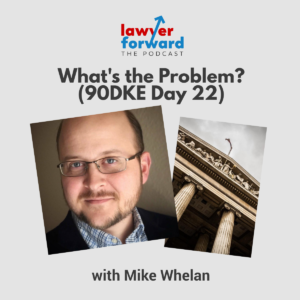Anjie Vichayanonda, Founder of Leg Up Legal
“And I got pressure on me / Seven days a week, it’s game seven on me / Life will test you out, you live through that, that’s testimony” — Big Sean
This week, I had the opportunity to catch up with Anjie Vichayanonda, Founder of Leg Up Legal, whose mission is to disrupt and revitalize the legal industry pipeline by providing meaningful mentorship to everyone.
During her years of practicing law, she learned how important it is to have good mentorship and sponsorship in your legal career. While she has been fortunate to have some wonderful and amazing mentors throughout her career, she realized that many others have not been so fortunate. So she set out to help prospective and current law students find good mentors and guidance early on before they embark on their career paths so that they develop the skills to get the right start.
As an attorney turned entrepreneur, first-generation Asian-American, intellectual property lawyer, and career coach, Vichayanonda has a trove of career and life experiences she leverages to help others on their legal career trajectories. Her energy and passion are contagious, and she will no doubt mentor countless students and inspire the next generation of attorneys and young professionals.
Without further ado, here is a (lightly edited and condensed) write-up of our conversation:
Renwei Chung: Can you share with us a little bit about your background and career path?
Anjie Vichayanonda: I am a first-generation Asian-American lawyer. My parents are immigrants from Thailand and both engineers. I didn’t know any lawyers personally when I decided to go to law school, so I tried to seek out advice from lawyers about what law school I should go to, what type of law I should practice, and what actual steps I needed to take to become a lawyer.
I cold-called over 50 lawyers to try to learn about their career paths. I only was able to connect with three lawyers, but luckily, one took me under his wing and became my mentor. He introduced me to dozens of other lawyers, and helped me decide which law school to attend and what type of practice area to focus on.
I graduated from the University of New Hampshire School of Law and practiced trademark and copyright law for five years before launching Leg Up Legal.
RC: What motivated you to start Leg Up Legal and what are you focused on during these crazy times?
AV: My first mentor taught me how to connect with lawyers on a meaningful level and build long-term professional relationships. He taught me how to “walk-the-walk and talk-the-talk” and ask the right questions. I realized how difficult it was for prospective and current law students to build up the courage to speak with lawyers and learn how to follow-up with lawyers to keep their relationships going.
Throughout my career, I mentored other young lawyers and law students to pay forward the kindness that I had received from my mentors. I watched my mentees struggle with many of the same questions and issues that I did. I realized that there still was not a good way for prospective law students to meet lawyers on a large scale or learn how to interact with them. So, I built the Leg Up Legal mentoring platform for prospective law students to connect with lawyers and learn how to build their first professional relationships.
RC: I came across your profile through a LinkedIn post and you seem to be very intentional in how you leverage social media. Any advice for fellow attorneys interested in creating engaging content?
AV: Thank you! Here’s my tips and tools:
- Use a content scheduler. I plan out and schedule my social media for the week on Saturdays. It helps you post consistently and at peak engagement times no matter your availability.
- One of my attorney friends recommended Shield for Google Chrome and I love it. It’s easy to see the performance of all posts at a glance. You can see what type of content performs well so that you can focus on creating that type of content.
- Hashtags on LinkedIn are really underutilized. You can use up to three hashtags in a post. If you’re going to create branded hashtags, you need to tell people how to use it. “Follow the hashtag #________ for tips on …” Putting that call to action in the post makes it way more likely that people will follow it and come to rely on it.
RC: We talked about being first in our families to pursue the law in our initial chat. What surprised you most about your time at law school or working at a law firm?
AV: My goodness, what didn’t surprise me is probably a much shorter list. What surprised me is how little most students understood about what the practice of law really is all about before they decided to pursue law school.
Law school doesn’t give you much time to do career exploration, and you have to start applying for summer internships and jobs a lot sooner than you think so you should really take some time before law school to connect with a lot of legal professionals and get an idea of what practice areas interest you.
You can go through every gateway to becoming a lawyer — taking the LSAT, attending law school itself, and taking the bar exam — and still have no idea what the actual practice of law is like if you don’t seek out opportunities to really talk to lawyers about what they do. You have to drive your own career exploration, and you have to start as early as possible.
RC: Much is written about the lack of diversity at law schools and law firms. What are your thoughts on this issue?
AV: The lack of diversity is a systemic issue that begins long before law school. If you want to meaningfully improve diversity in our profession, it is not enough to start diversity initiatives at the law school level. You need to start at the undergraduate level or even before.
Many law firms and legal employers invest in “pipeline” programs at the law school level, including internship, fellowship, and mentoring programs for diverse students, but these programs only help the lucky few who make it into law school in the first place.
Thousands of worthy diverse candidates get left behind at the gates. If you want to improve diversity in the profession, you have to help diverse prospective law students develop an interest in law, nurture it with mentorship, and give them access to affordable LSAT prep and law school application prep if you want them to even make it into law school.
RC: You have a very impressive bench of Advisors at Leg Up Legal. We actually featured Caren Lock on ATL before. How do you choose your advisors and what type of relationship do you have with them?
AV: Caren is wonderful. She has known me the longest, and I met her through my first mentor so she’s seen my career evolve all the way from before law school to now. When I dove into the world of entrepreneurship, I knew right away that I was out of my element.
While being a lawyer and having a past career in marketing helped me in many aspects of building my business, I knew I needed a team of people who were experienced in many other areas to help guide me and Leg Up Legal. I chose my advisors because they all had experiences working with our three distinct types of customers: undergraduate universities, legal employers (and associations), and individual college students.
We have individual and group meetings to exchange ideas. They help me stay grounded, provide feedback and strategy, facilitate introductions, and some even participate as mentors in our mentoring program.
RC: COVID-19 has taught, and continues to teach, our society a bunch of lessons. What have you learned during this pandemic era?
AV: Relationships and human connection are vital during tough times. Now more than ever, we’ve seen students reaching out for guidance and emotional support. Having people to support you makes all the difference when you encounter difficulties and challenges. We started hosting a bunch of free events on Zoom to allow prelaw students, current law students, and lawyers to connect with each other and bond.
You can create real, lasting friendships and meaningful mentoring relationships through virtual mediums. I’ve seen it happen with my own eyes. We hosted a huge two-week virtual legal career boot camp in September for incoming law students, and I watched people have the most frank and emotional conversations during that event. And I’ve seen it happen time and time again in our virtual events and through our virtual mentoring program.
You have to get over the initial mindset that online interactions are just less personal. They don’t have to be. If you don’t believe me, come hang out on one of our events, and you’ll see.
RC: It was great chatting with you. Is there anything else you would like to share with our audience?
AV: We host a bi-weekly Virtual Happy Hour for ALL prelaw students, current law students, and lawyers to help create new networking opportunities and the registration links for those are included in the Weekly Zoom Meetup emails. We’ve had law students and lawyers from all around the U.S. attend. Register for the bi-weekly happy hour here.
For one-on-one networking and informational interviews, join our LinkedIn group, the Leg Up Legal Virtual Coffee Club. If you join the group, you can set up one-on-one virtual coffee chats with prospective law students, current law students, and attorneys.
Lastly, feel free to connect with me on:
On behalf of everyone here at Above the Law, I would like to thank Anjie Vichayanonda for taking the time to share her story with our audience. We look forward to following her successes and wish her continued achievements in her career.
Renwei Chung is the Diversity Columnist at Above the Law. You can contact Renwei by email at projectrenwei@gmail.com, follow him on Twitter (@renweichung), or connect with him on LinkedIn.
 Jordan Rothman is a partner of The Rothman Law Firm, a full-service New York and New Jersey law firm. He is also the founder of Student Debt Diaries, a website discussing how he paid off his student loans. You can reach Jordan through email at jordan@rothmanlawyer.com.
Jordan Rothman is a partner of The Rothman Law Firm, a full-service New York and New Jersey law firm. He is also the founder of Student Debt Diaries, a website discussing how he paid off his student loans. You can reach Jordan through email at jordan@rothmanlawyer.com.









 Olga V. Mack is the CEO of
Olga V. Mack is the CEO of 




